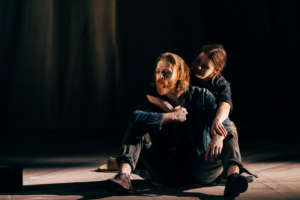Review: THE SECRET RIVER, National Theatre

![]() Kate Grenville's acclaimed 2005 novel, The Secret River, centres around the brutality and tragedy surrounding the colonisation of Australia. After premiering in Sydney in 2013, the award-winning theatrical adaptation comes to the National's Olivier Theatre after blistering reviews at the Edinburgh Festival.
Kate Grenville's acclaimed 2005 novel, The Secret River, centres around the brutality and tragedy surrounding the colonisation of Australia. After premiering in Sydney in 2013, the award-winning theatrical adaptation comes to the National's Olivier Theatre after blistering reviews at the Edinburgh Festival.
This run follows the sad news a few weeks ago that one of the stars, the brilliant Ningali Lawford-Wolf, had died during the Edinburgh run. Her family gave their blessing for the London shows to continue and Pauline Whyman takes on her role as narrator.
It is 1813 and English convict William Thornhill has earnt his freedom in Sydney. Desperate to find a place to call his own, he travels with his family up the Hawkesbury river to claim ownership to, what he believes is, an empty piece of land. However, the land he wants is already occupied by a family from the native Dharug tribe. As the families become aware of each other, a fragile tolerance and begrudging rapport turns to tragic brutality, as the true consequences of colonisation become clear.
The first act is a little slow-moving, as the story is carefully plotted and the foundations are laid for the powerful and tragic second act. Director Neil Armfield allows the crackling tension to grow organically, so the progress from occupation of the land to violent bloodshed feels inevitable, but also horribly believable.
There are many layers to this story; the initial fear of each family of the other and then the slow movement towards a kind of cautious rapport. The younger characters play together with the purity reserved for children and there are tentative trades of food. The sub-plot of a white settler 'married' to a Dharug woman, played with gruff sensitivity by Colin Blackwood, is both touching and tragic. This fragile peace cannot last, as ultimately the settlers refuse to leave land that was never theirs to take.
Nathaniel Dean reaches the many levels of the character of William Thornhill, based on Grenville's own ancestor; he is a decent and hardworking man whose desire for a solid future for himself and his family clouds his judgement. There is an authentic and very believable chemistry between him and wife Sal, excellently played by Georgia Adamson. Adamson is likeable and generous, yearning for London but respectful of the differences she finds in Austrailia.
The cast, of both First Nation and European heritage, is wonderful. Among the other white settlers, Jeremy Sims is outstanding as the vulgar and violent Smasher Sullivan; a deeply unlikable and volatile character, Sims is completely convincing in the role. The Dharug people speak Dharug, but are given a voice through the creation of a narrator, Pauline Whyman, who infuses worldliness and knowledge into her role. Major Sumner AM is a forceful presence as Dharug leader Yalamundi and Shaka Cook is wry and natural as Ngalamalum.
Music is a huge part of the production. The traditional songs of the Dharug are set beautifully alongside the English nursery rhymes that Sal sings with her children. There is also a hugely powerful scene where the British men advance on the Dharug as they sing 'London Bridge is Falling Down', growing louder and more aggressive with every step. The effect is almost overwhelming and suitably terrifying.
Iain Grandage's music also filters through every part of the play, with Isaac Haywood's tender and atmospheric accompaniment at the side of the stage, frequently complimented by instruments and sound effects played by various cast members. The one criticism would be that occasionally the music is so loud that it drowns out some of the words of the cast, particularly Whyman's narration.
Stephen Curtis' set design and Mark Howlett's lighting is perfectly judged, with sparse and vast landscapes and long shadows cast over Australia's huge hills. The whole design is very evocative of the dirt, dust and sweat of life at the time.
This is a brilliant handling of a highly sensitive subject that deserves much more attention. It is a powerfully thought-provoking production that stays with you long after you leave the theatre.
The Secret River is at The National Theatre until 7 September
Photo Credit: Ryan Buchanan
Reader Reviews

Videos

